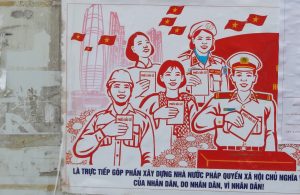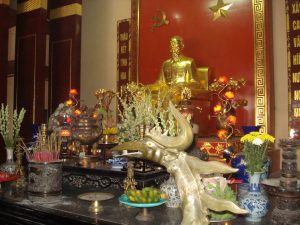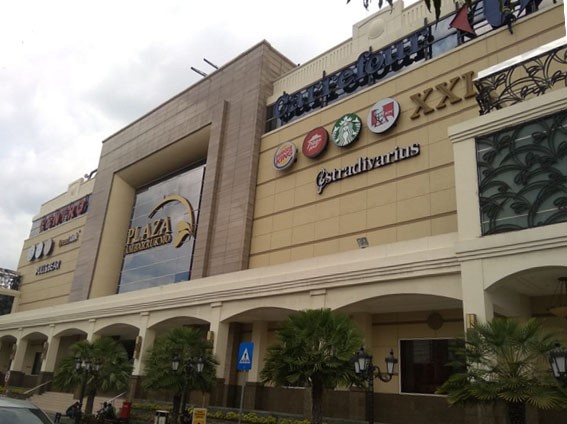Belying its international reputation as an exemplar of Covid-19 containment, Vietnam on the 23rd of May hosted its biggest mass movement of 2021 – election day. Understanding why Vietnam takes its election seriously despite the worsening pandemic requires a deeper reading. While the political significance of the vote in a single-party state maybe minimal, a reading of what it signifies reveals often overlooked insights, writes To Minh Son
_______________________________________________
On the 23rd of May 2021, amidst exacerbating Covid-19 developments, millions of masked Vietnamese shuffled through the polling stations decorated in classic Communist red and patriotic slogans. Voters zipped through the procedures—from medical check to filling and casting the ballots—as a mix of officials and volunteers supervised the process. Prominently placed inside the station, a bust or framed portrait of Ho Chi Minh watched over the voters—a formal yet familiar face in all Vietnamese official décor, from classrooms to amphitheatres. The turnout for 2021, unsurprisingly, was near absolute – around 95% by the end of the election day.
For a country whose democracy is often considered to be merely procedural, it is curious why the Vietnamese Communist Party takes this electoral ‘performance’ seriously amid an aggravating pandemic. During election day, 131 new cases were reported, climbing since prior weeks, the pandemic has since morphed into a national crisis. This belies the international reputation of a country that took stringent and comprehensive measures to contain Covid-19, once drastically curtailing New Year festivities during the onset of the pandemic. It seems the Vietnamese democratic festival continues while cultural festivities are suspended, despite its exemplar practices.
While there may not be much political significance to the Vietnamese election, there might be something in its political signification—how the vote makes sense in the Vietnamese sociocultural context. An analysis of its symbolic construction goes beyond the functional view of the vote – as a democratizing process— and can reveal how the vote matters, even in Vietnam.
Beyond functionalism: Ontological reflections on Vietnamese politics
Thinking about politics in Vietnam requires, first, stepping back momentarily from preconceived political concepts to reflect on the nature of politics in Vietnam. Gainsborough discusses this sensitivity in his readings of two distinguished Vietnam scholars, Malesky and Fforde. Whereas Malesky—a quantitatively oriented scholar with a penchant for empirical testing—takes the Vietnamese state seriously and prescribe it with intentionality, Fforde—a qualitatively oriented scholar focusing on policy discourse—finds its policies incoherent and the state rather incompetent. Fforde is critical of the concepts—policy rationality and functional institutions—that enable Malesky’s analyses. While we cannot adjudicate which perspective is better, different perspectives operate to different utilities in different informational contexts. In settings where information is deliberately kept limited, qualitative work might yield insights otherwise uncaptured by quantitative approaches.
More nuanced readings of Vietnamese politics can reveal important ambiguities. Taking cues from Fforde, he finds the Vietnamese state falling short of a Hobbesian ‘Leviathan’ in its lack of capacity to implement policies, where local insubordination takes on a proverbial common sense. In Vietnamese, the notions of (official) authority and coercive power are often conflated and confused together. To Fforde, “anybody who asked about how to understand the very nature of the state—its ontology—could not receive a satisfactory answer.” Indeed, that the state in Vietnam is treated as a coherent, monolithic entity may arise from political and commercial needs within and outside Vietnam—as rational, governable, capable of trade.
Dense concepts of the state and instruments—democratic or otherwise—might not be as readily applicable in Vietnam as they are in established Western democracies. Indeed, elections under authoritarianism function differently than their ascribed purposes, rather idiosyncratic across different cases, with micro-level dynamics escaping scholarly attention. Uncritical application of concepts derived from Western contexts might generate a functionalist logic that restricts political analyses of authoritarian politics to mere measurements of their democratizing prospects. An anthropological sensibility to democracy reveals that its associated constructs acquire local meanings that are ambivalent about democratizing prospects. Understanding elections anywhere requires us to contextualise them—perhaps more so within societies where democratic mechanisms have not done away authoritarian streaks.

The Vietnamese election: Rhetoric, theatrics, or symbolics?
Whereas the ‘political’ as a signifier in the West can encompass almost anything, its meanings are much more restricted in Vietnam. The Vietnamese word for ‘politics’—‘chính trị’—typically connotes the affairs of politicians and prefixes titles of organs of the Party and state. Not everyone can have their say in politics: The ‘political’ label is consciously avoided by NGOs and the press, for example, their concerns often labelled ‘social’ (xã hội) or ‘cultural’ (văn hóa). Vietnamese talk about politics all the time—from streetside tea stalls to modern cafés—but once placed within public contexts, the ‘political’ is scrubbed off. That the ‘political’ referent in Vietnam is highly restricted and disables imaginations is perhaps the extreme version of what Edelman meant when he said that “political language is political reality” insofar as “the meaning of events to actor and spectators is concerned.” Paying attention to discourse, the political realm in Vietnam is rife with official discourse that manages to outvoice alternatives and say very little by saying a lot. In such a depoliticized public, it is little surprise that elections never quite mattered in the functional, transformative manner they are thought to have.
Stripped of substantive content, the Vietnamese election may amount to little more than theatrics: To put up a show. Still, a one-Party show with low-stakes, little drama, and predictable outcome does not make for good entertainment. American elections excel in this respect, and so one may find Vietnamese who closely follow American politics, yet do not know who they voted for in their own election. The Party insists on hogging the stage for itself, stopping any uninvited entrants. If the Vietnamese election fell short of theatrics even within its domestic audience, it is doubtful that it could be highly regarded by an international audience. The cost of around $66 million (or 1500 billion VND) to organize the election, however, betrays any kind of rationality attributable to theatrical effects.
If neither rhetoric nor theatrics could fully account for the Vietnamese election, we can perhaps apply to it the symbolic lens: the Vietnamese election as ritual. Steven Lukes offers an authoritative definition of the ritual as a “rule-governed activity of a symbolic character which draws the attention of its participants to objects of thoughts and feeling which they hold to be of special significance.” This ritual “serves to specify what in society is of special significance, it draws people’s attention to certain forms of relationships and activity”, and importantly, “deflects their attention from other forms, since every way of seeing is also a way of not seeing.” Elections “are the most important form of political ritual in liberal democratic societies,” but “the extremely high voting figures evidently have considerable symbolic significance” also in the USSR. Through rituals, a community takes its form; through elections, eliciting mass participation, the state becomes tangible; through the vote, people symbolically participate in the state and become ‘citizens’. Turnout matters in democracies just as much as in autocracies, signalling state capacity to mobilize people to its domain, rather than just democratic credibility. Perhaps that is why in the midst of the pandemic, the one single undisrupted activity across all modern states is the election: To not have one is perhaps to not have a state at all.
Paying attention to the constitutive elements of the vote—from the polling station, the ballot, to the affects it incites—enables us to peer into its contextual meanings and signification, which vary with different enactments of the vote. Tracing the voting rituals in France and the United Kingdom, for example, reveals different conceptualizations of the citizen, public space, and democracy. The distinctiveness of French secularism, revolutionary history of democracy, high differentiation of the public-private spheres, highly rationalized voting protocols and campaign rules, are juxtaposed against the British more evolutionary history of democracy, with emphasis on engaging the private realms of people, active political campaigns, simpler and practical protocols, and heightened attention to outcomes rather than process. In contrast, in Bosnia-Herzegovina, it is not through the historical but rather the technical—the veneer of objectivity and imported expertise in democracy—that democracy is constructed. While professionalism marks the voting rite as an independent process among existent, still violent political forces in the country, it also paradoxically renders any slight modification of the process contestable. As such, reading the vote in this manner reveals the contextual meanings often glossed over in a consequence-oriented analysis.
The Vietnamese Vote as a Right and a Rite
Like how the secret ballot in France and the United Kingdom evokes the image of the Catholic confessional, the Vietnamese vote can also find its spiritual equivalents within the sociocultural context of Vietnam. Spiritualism and politics are not so far apart in Vietnam, as the Party itself actively participates in religious affairs and appropriates folk beliefs into its nation-building discourse. Spiritual and religious symbolisms in Vietnam are prominent enough that the Party cannot ignore it.
In that context, one powerful signifier is the festival. The Vietnamese press has described the electoral spectacle as ‘ngày hội lớn nhất cả nước’, literally translated as ‘the biggest festival in the country’. Of note here is the word ‘hội’, which in Vietnamese can be used to refer to both festivals, political union or assembly, or the activity of gathering itself. When used to describe festivals, it often stands behind the Vietnamese word ‘lễ’, which refers to rituals, ceremonies, or etiquettes, forming the compound word ‘lễ hội’—the gathering of rituals. The press does not nakedly describe election day as ‘lễ hội’—a term reserved for cultural activities and actual festivals—but the fact that the ‘hội’ referent is prominently used is revealing. The collectivity of the vote perhaps lends itself to this. Pilgrimages figure well in Vietnamese cultural practices—public massing and moving to certain areas of spiritual significance to partake in defined sets of ‘lễ’ associated with distinctive beliefs, deities, and importance. The way the election day is described by the Vietnamese press calls to mind that of the Hùng Kings’ Festival, celebrating the great ancestor of the Vietnamese nation. Both are mass events, imbued with a deep sense of national unity, with the latter being an invented tradition that naturalizes the Vietnamese nation-state by remembering its originator.
The symbolism of ‘hội’ also manifests physically through the objects, gestures, and habits at the polling station. The physical spaces chosen to organize the vote are not only places of practical convenience, but of traditional and spiritual significance as well. Besides schools and public buildings, the polling station is constructed in historical landmarks, Buddhist temples, pagodas, and the peculiarly Vietnamese ‘đình’, translated as village shrine or communal temple. We would be remiss to suggest that polling stations could be held in churches or cathedrals in highly secular democracies like France while this is acceptable in countries like the United States. The metaphor goes deeper when one recalls that Ho Chi Minh—the décor centrepiece in each polling station—is a popularly venerated and deified figure for Vietnamese.
Going to vote or visiting the temple also mirror each other. To denote the officiality and solemnity of the polling station, there are strict instructions for decoration: The exterior should be fitted with slogans, strung with flags, the candidate lists, while the interior should consist of voting utensils like pens, chairs, tables, alongside more slogans and décor. This is comparable to the decoration of temples, where there also ‘ngũ sắc’or five-coloured flags (alternatively called ‘cờ thần’ or ‘deity flag’) and poetic couplets before and within the temples, all commanding reverence. Voters are to follow strict conducts, maintain silence and order, entering right and exiting left, which are also etiquettes when entering temples.

The voting act itself can be convincingly construed as a prayer or a wish that voters make. The temple visitor lights an incense and places it the incense holder, clasps their hands to ‘khấn’ or make a request to the deity by mumbling to themselves or in their minds, then walks outside. The voter goes to the identification table to get their ballots, walks to semi-private booths, privately think about their choices, pens down their candidates, goes to the ballot box to drop in their filled-in ballots, and then walks out. The voting or wishing acts are done quickly, heeding the lines of people behind, watched by temple or official attendants. Thus complete the rituals.
The symbolism is additionally expressed through the social roles it takes on: Who cares about the vote and why? In Vietnam, there is persistent confusion about the vote that resurfaces with every electoral season. In the current constitution of Vietnam, Article 15 stipulates that “citizens’ rights are inseparable from citizens’ duties” and “citizens are responsible to practice their duties to the State and society”, while Article 27 stipulates that “citizens shall … have the right to vote.” Despite the seeming conflation of duty and right, there is no penalty nor punishment for not voting in the Vietnamese election. This ambiguity appears deliberate, comparable to how the community beckons everyone to participate in its culture—traditions command respect without codification. And like tradition, it is often the seniors who make a case to go to the polls. Political disinterest and apathy are rife among Vietnamese youths to the dismay of the greatest promoter of this political tradition—the elderly General Secretary of the Party in Vietnam.
Taking stocks of Vietnamese sociocultural field, a symbolic analysis of the Vietnamese election as a ritual reveals interesting insights. The Vietnamese vote is densely packed with signifiers, manifesting in language, history, physical space and gestures, and social perceptions. While the vote may not change the political landscape in Vietnam, to cast a vote in Vietnam may have just as much utility as lighting an incense: Spiritual reassurance, at best, for the prayer or the party.
*Banner image by Element5 Digital on Unsplash.
* The views expressed in the blog are those of the author alone. They do not reflect the position of the Saw Swee Hock Southeast Asia Centre, nor that of the London School of Economics and Political Science.





